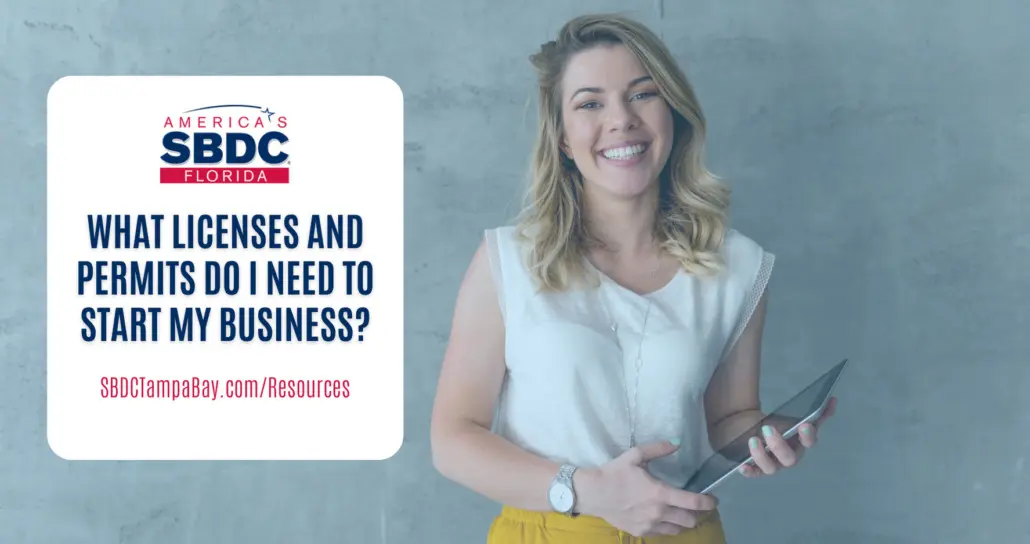
by Christine Jaros | October 30, 2023
Now that you’ve registered your business, obtained your Employee Identification Number (EIN) and opened a business bank account, you need to also explore what licenses, certifications and permits your business needs to legally operate in your location and industry. This is usually the most complicated and confusing step in getting your business up and running. But it doesn’t have to be. Detailed below are a few key topics in understanding what your business needs, where to explore industry/locality requirements, and how to obtain them.
The Business Operating License – For Every Small Business
The Business Operating License is a basic requirement for most businesses that allows you to operate in a city and state. Don’t confuse this license with obtaining your legal business entity via your company registration with the Department of State (Sunbiz). Your company registration essentially creates and recognizes the legal existence of your business. The business operating license is a general blanket license giving you permission to conduct business activities in a city or county.
In the state of Florida, business operating licenses are typically issued by the local government versus being issued at the state level and are based on your business operating locations. It’s important you check with your local municipality or county clerk’s office/website to obtain your business operating license as these licenses vary by city and county and can change over time as well. In addition to filling out an application and paying a small fee, you will need to make sure your business complies with all local zoning, health and safety requirements and regulations which will vary depending on the type of business you have. Know also that some businesses may require inspections or approval by other government departments.
Seller’s Permit
If your business sells goods (products) – whether online or in person, you will need a seller’s permit. This permit gives you authorization to collect sales tax from your customer’s purchases and remit them to the appropriate tax authorities. With regards to E-commerce, Florida defines an E-commerce website as a “dealer”. Florida is also a state that taxes based on destination (versus origination) so the sales tax will be calculated based on where the products are being shipped.
Note also, some services in Florida are subject to sales tax. This includes but is not limited to security services, commercial pest control, non-residential cleaning services and health club memberships. For any questions, check with the Florida Department of Revenues.
Since sales tax rules and rates vary by city, county, and state, you might also consider software to help with your tax collection and remittance. For a seller’s permit, go to the Florida Department of Revenue’s website at Florida Dept. of Revenue – Florida Dept. of Revenue (floridarevenue.com)
Special Permits
Depending on your industry, profession, or business activities, you may require special permits. These can include alcohol licenses, fire permits, health permits, and other industry specific permissions. You can check these requirements on The Florida Department of Business & Professional Regulations (http://www.myfloridalicense.com/DBPR). Here you can also apply for these permits/licenses.
Fictitious/Doing Business As (DBA) Name Statement
Many register a business name when they open their small business but end up operating under a different brand name. If you did not include this brand/fictitious name or DBA (doing business as) name within your initial company registration, you will need to register it now so that you can provide the documentation for transparency to your customers and suppliers. Fictitious name registration can be found here https://dos.fl.gov/sunbiz/start-business/efile/fl-fictitious-name-registration
Industry Licenses and Certifications
Companies in regulated industries – like banking, hair salons, healthcare, veterinary, food services, construction and real estate may need special licenses and certifications that provide customers with the knowledge that these businesses have met specific industry standards and regulations. Since these vary greatly by profession and industry, business owners must check with the Florida Department of Business and Professional Regulations (http://www.myfloridalicense.com/DBPR). There you can search initially by industry, drilling down to the detail of your specific profession/job.
Manufacturing products like cosmetics, perfumes, body lotions, food products, etc. should also check on definitions with regards to cottage industry versus otherwise. You may also need to seek information regarding your regulations on the Florida Food & Drug Administration website at https://www.fdacs.gov/
Overall, it is important to take the time to research and explore what licenses, certifications, and permits your business will need to legally operate in your location and industry. Obtaining the correct license and permits ahead of time can save business owners time and stress when the time comes to do actual business.



Christine Jaros
Consultants, Jaros, TampaSpecialties: E-commerce, Marketing & Sales, Startup Assistance, Organizational Development Christine Jaros provides business consulting in the areas of startup, business plan development, marketing and sales, e-commerce, finance, wholesaling and retailing, and business management. Before joining the Florida SBDC at USF, Jaros owned her own apparel wholesale sales and consulting business in New York City for 14 years. She has more than 35 years of experience as a professional businesswoman. Jaros built a global-focused career specializing in manufacturing, marketing and sales with organizations including Bidermann Industries, Liz Claiborne Inc, and Hartmarx Corp. Working with iconic brands such as Yves Saint Laurent, Liz Claiborne, Calvin Klein, Polo-Ralph Lauren and Austin Reed, Jaros grew her portfolio of skills to include international sourcing and distribution. She is a certified TTI DISC Certified Professional Behavioral Analyst and TTI DISC Certified Professional Driving Forces Analyst and a certified Associate Business Continuity Professional (ABCP). Jaros obtained her bachelor’s in business management and marketing from Ohio University. She went on to study fashion and apparel in Paris, France, and later received a finance-focused Executive MBA from Pace University in Manhattan.